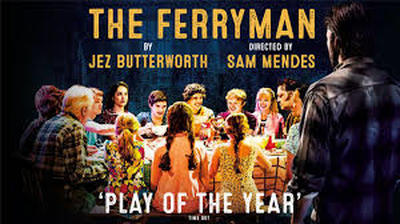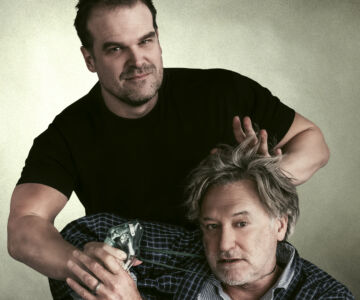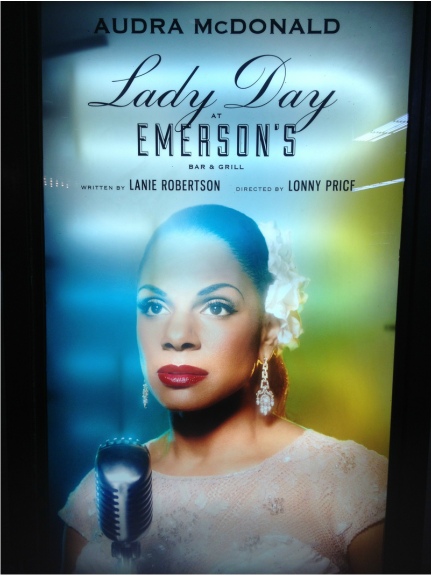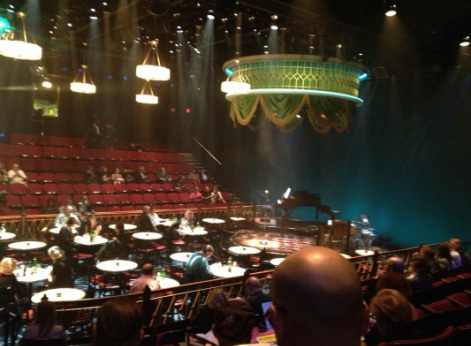 Eating Vegan in Kyiv: Decent Food Around Town as Veganism Growsby Randi / May 2, 2018
Eating Vegan in Kyiv: Decent Food Around Town as Veganism Growsby Randi / May 2, 2018I know I tend to be extremely critical of what is in truth fairly decent theatre in London (I take my lead from the basketball coach in “Love & Basketball” (“you think I’d go hoarse for a player with no potential?” = how I live my life)). And while I’ll stand by my affirmation that British musical theatre is in an abysmal state, they do know how to do dramatic plays here. One of the most exciting British playwrights is Jez Butterworth (actual name), and every time he premieres a new play everyone on both sides of the Atlantic goes oh boy in a good way. His play “Jerusalem” won Mark Rylance another Tony and people raved about it even though I have approximately zero idea what was happening on that stage aside from Mark doing a keg stand at one point I think? I skipped Hugh Jackman in “The River” because early reports said he pretty much sits on a log and de-bones a fish for the 2 hours and as fascinating as that shit sounds my attentions were better diverted elsewhere. Luckily, third time appears to be the charm for me and dear old Jez (who I just learned wrote “Spectre” and “Edge of Tomorrow”?? way to get those Hollywood bones Jezzy!) because his newest work “The Ferryman” is astonishing.
“The Ferryman” tells the story of the Carney family in northern Ireland during the Troubles, when the Irish Republican Army was getting more and more violent and they ‘disappeared’ nonconformists and fighters were dying of hunger strikes and generally everything was a bit terrifying for mostly everyone, as is normally the case during times of war and/or struggle. The Carneys are a large clan with more and more children seeming to come out of the baseboards as the story begins, including an actual baby. When one of the teenage kids comes down the stairs (really steep really long stairs, mind you, and I was like omg don’t fall don’t fall omg don’t) holding the real infant and not a doll or a wrapped up melon like plays usually use, the audience gasped like they had never seen a baby before. I mean I get it, it is noteworthy and look I am talking about it still, but man alive. The audience similarly gasps and shrieks when live rabbits and geese appear onstage (I do not approve of using animals for your art because most of the time it is unnecessary and here it also adds nothing but at least they treat the animals well? ughhh stop it though).
We meet the apparent heads of the family, Quinn (Owen McDonnell) and Caitlin (Rosalie Craig), in the wee small hours, having a grand time (they do say grand a lot too, these Irish) as everyone else (children, cousins, ancient great aunts and uncles) sleeps. When it is revealed through casual dialogue in a later scene that Caitlin is actually Quinn’s sister-in-law, and he’s really married to a different woman named Mary (we had an understudy and she did not make an impression, although the character doesn’t have much to go for her anyway), the realization is even more dramatic than the one for ‘oh shit that’s a real baby!’ It’s one small example of how the meticulous direction and writing makes everything seem momentous and yet realistic at the same time. Caitlin married Quinn’s brother Seamus decades prior, and they had a son who is now a teenager. But 10 years ago, Seamus went missing, and ever since then Caitlin and her son have been living with Quinn and his family and the extended fam in a situation ripe for drama, not the least of which is that Caitlin and Quinn have been falling in love with each other.
Their world is shaken when news arrives that Seamus’s body had finally been found, putting to rest any doubts about whether he had run off or had been taken out as well as any hopes of his return. Considering how long they’ve lived without him, it shouldn’t have been too difficult to adjust to the truth, especially since many assumed he was dead from the start. But it’s undeniable now that his death was linked to the IRA, and not for Seamus’s own doings but for his brother’s, and so the whole family is in jeopardy until the Mafioso-like boss man is satisfied that the family will stay quiet about it all. Meanwhile, it’s time for the men to bring in the annual harvest and celebrate it, so they invite their cousins in to help with the work and the food-filled celebration, all while we hear of the freedom fighters dying of hunger strikes. The family lives, like everyone does, in whatever protective bubble they can form, but as always the outside world bursts it eventually.
The arrival of the tough male cousins for the harvest brings even more issues, as they are much more politically oriented and eager to join the IRA. Their younger cousins are susceptible to their big ideas, especially Caitlin’s son Oisin (Laurie Kynaston who pretty much shook the entire time to convey how f-ed he was), and their conversations about the fight and what needs to be sacrificed for freedom were stressful beyond belief. The line between what’s necessary for freedom and what should never be asked of someone has never been dramatized so well by simply having young men talk out their asses, as they do. The acting in these scenes from Francis Mezza and Terence Keeley had my blood pressure up so high, like dangerously high, so they must have done a really good job. Fortunately these scenes, of all the male cousins, have the best comic relief. There’s the youngest of the visiting cousins who curbs his constant drinking (as everyone onstage is indeed constantly drinking; they are Irish) with “Well, as they say, there’s only so much whiskey a 13-year-old boy can drink.” And then there’s my favorite line in the whole show, when one of them tells the joke: “You know how you know The Elephant Man was a Protestant? Because he looked like a feckin’ Protestant.” Oh my god it’s my new favorite joke.
Even with all these child actors (who are notoriously weak save for Sydney Lucas), I can’t think of one false note from this cast. I was nervous because we saw the replacement cast, as I was stupid and didn’t really care to see the show when it first premiered because I had musicals to see baby! So we missed out on the great Paddy Considine and Laura Donnelly as Quinn and Caitlin. Laura won the Olivier for this role and – more importantly – appears from my research to be the g-d inspiration for the play, as her uncle was disappeared by the IRA when she was a baby and Jezzothy was like hey partner-at-the-time-is-it-gonna-be-weird-when-we-make-this-play-and-we’re-no-longer-together, that’s sounds like a good idea for a play! Feck, as they say. But I honestly can’t imagine the original cast being any better. I had no idea that Rosalie Craig, who I really like, was going to be in it, so I was excited and my high expectations were exceeded beyond measure. Everyone was fantastic, not least Justin Edwards as Tom Kettle, the slow Englishman who the Carney family helps and treats as family despite all the republicans despising every last English person and wanting to get rid of him simply for his heritage. His Tom pulled at all the heartstrings but good, even though I think the large-and-dim-witted-but-good-hearted-man-who-will-face-tragedy-by-play’s-end trope has been overused in theatre.
Given how much happens and how much we learn about so many characters, it’s surprising that it’s only three hours. The fact that I’m using the word ‘only’ to describe a play that’s longer than my two faves of this season (The Band’s Visit and Once On This Island) PUT TOGETHER and that has only one interval so I had to pee distractingly badly says a lot about how well done it all is. I can’t think of a better written play I have seen over here, honestly. The layers of interpretation and meaning in the writing never seem to reach an endpoint. So much symbolism abounds and so much links the different generations. The title refers to the mythological ferryman, Charon, of the river Styx who collects the souls of the newly dead and brings them from our world to the other, except for those souls from bodies left unburied (like Seamus) who have to wander the shores for 100 years. The darkness of this reference adds even further shadow to this story. The thwarted love between Caitlin and Quinn mirrors the sadness of their own relatives, with both great aunts telling the children the tales of their lost loves. One of those aunts, the best one, named I shit you not Aunt Maggie Far Away (because her dementia brings her to far away places when she isn’t present), recounts at one point her siblings’ dealings with the IRA when they were younger, and how when those interactions came to a head she saw banshees, endless scores of them, on their farm. When she screams at the end that she sees them again, coming to this farm, and that everything mentioned earlier has come full circle as history always does, you realize that Jezzbury does full circle endings better than Amy Sherman-Palladino could ever dream. And that ending, man alive (or not, as it is). I will break my normal rule of spoiling whatever I write about since this one is coming to Broadway next season and I don’t want to ruin anything, so I’ll just suggest that you gird your loins.
INFORMATION
“The Ferryman” is playing at London’s Gielgud Theatre until May 19. There is one interval after just under one hour, which means you have to go two more hours without a bathroom break, unless you are the lady in front of me who positively SPRINTED during the 2-minute ‘pause’ between Acts II and III and made it back just as the lights were dimming again so needless to say I have a new hero. I enjoyed my seat on the stage left aisle in the front of the stalls, but be warned that the Gielgud, like the vast majority of London theatres, is a POS when it comes to design so the only bathrooms for the stalls are literally in the back of the stalls, and getting to them if you aren’t in the back is like a Tough Mudder course. Also, there are only 3 stalls. For the whole of the orchestra level. Someone needs to shut down all of the West End and refurbish these theatres until they make one iota of goddamn sense.
AUDIENCE
The audience was fine as far as phones go, decent as far as whispering goes, and horrible as far as being so sick that they should have gone to hospital instead of the theatre goes. Blech.
BEST PART
It’s five minutes’ walk from Yorica, the vegan ice cream salon, so yay because after the play ends and you are like ‘oh my god oh my god what the feck the previous three hours of my life and the previous hundred years of UK history is now falling on top of me and crushing me metaphorically but it all feels so real because well it is real and oh shit is it all going to happen again because of Brexit and what did humans do to this world and ahhhhhh’, you can go get ice cream and you really should because it helps.







